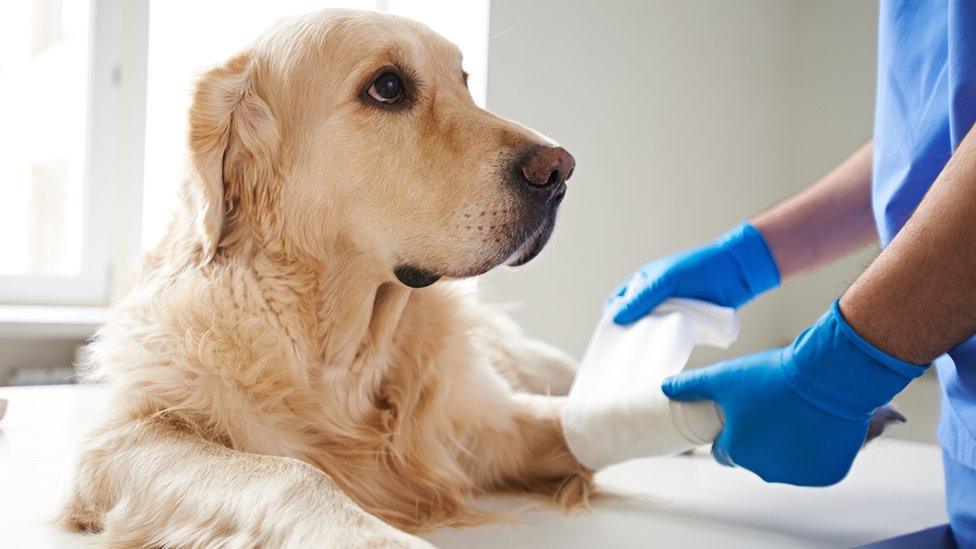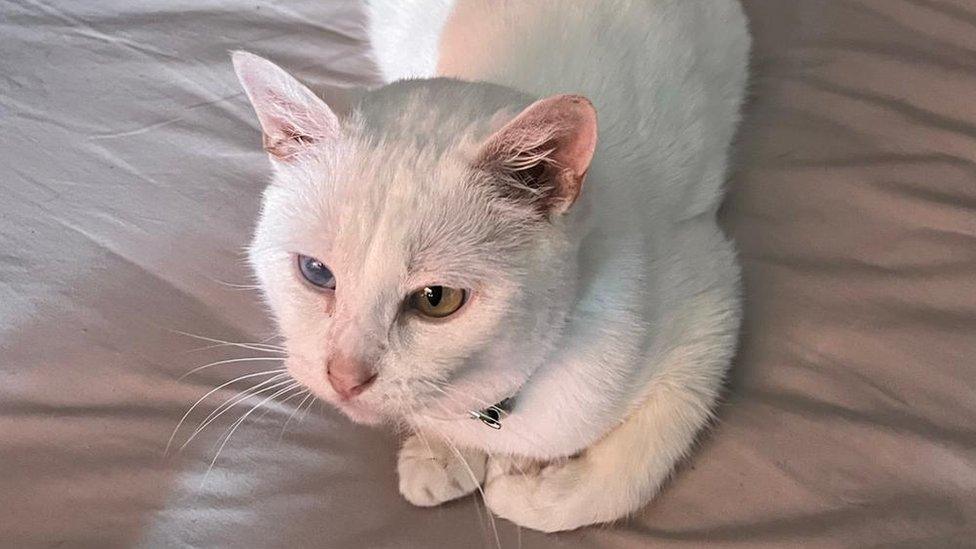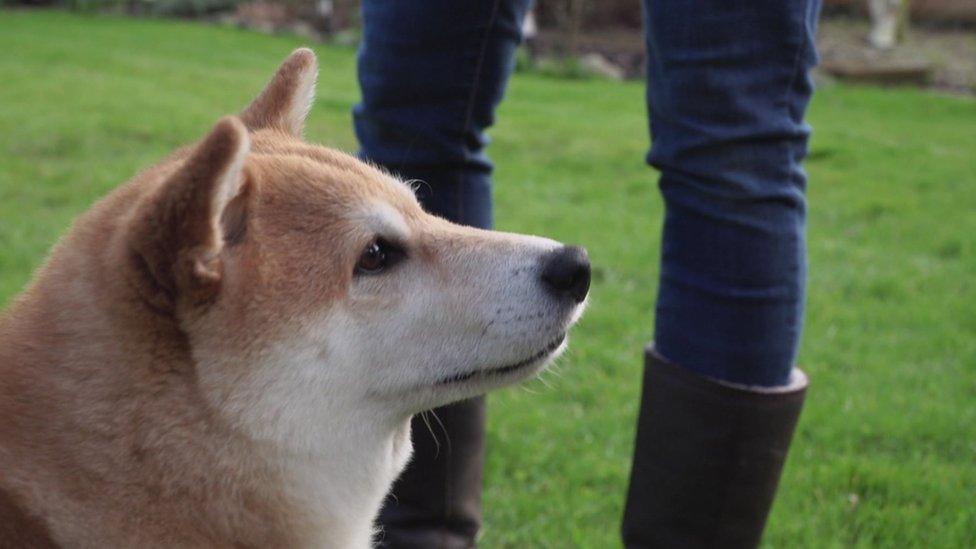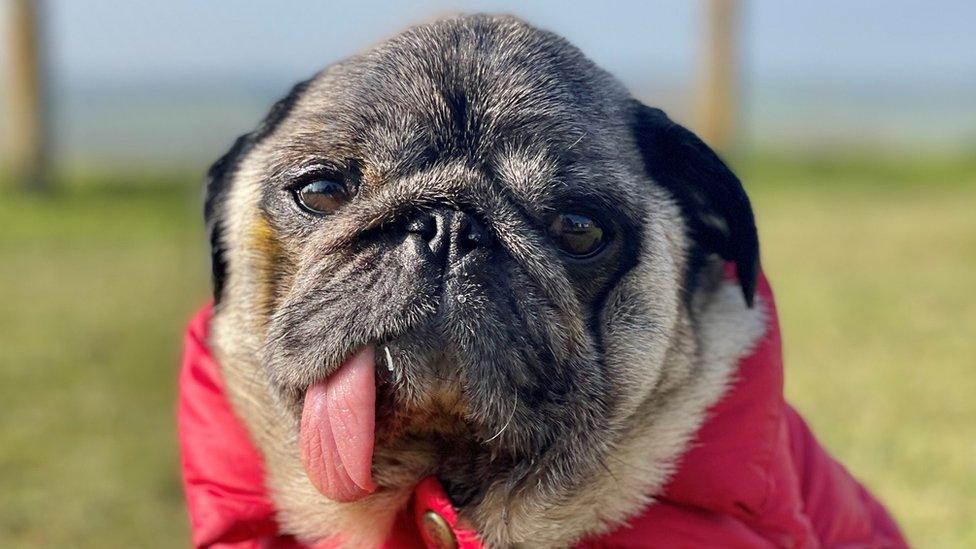Warning pet owners could be overpaying for medicine
- Published
- comments

Pet owners may not be given basic information like price lists online and are not always informed of the cost of treatment at a vets before agreeing to it, a watchdog has warned.
The Competition and Markets Authority (CMA) checked thousands of practice websites and found more than 80% had no pricing information.
It means owners may be overpaying for medicines or prescriptions, it said.
Its boss said it had found "multiple concerns" with the veterinary sector.
The British Veterinary Association said that vets were "fundamentally motivated by animal welfare".
The CMA has now provisionally decided to launch a formal market investigation, which means it could intervene directly in the market in the future.
If a formal investigation upholds its findings, it would give the CMA the power to compel companies to give it a full set of information about its business and prices, impose limits on prices for things like prescription fees, and potentially even enforce the sale of certain businesses.
The vet industry is worth £2bn after pet ownership rose to two-thirds of UK households during the coronavirus pandemic, according to the CMA.
But the watchdog cited concerns over a lack of information available for 16 million UK pet owners.

Caitlin Dolan took her cat Precious to the vet when she became lethargic
It analysed 1,400 websites for general vet practices belonging to big corporate groups and found 83% provided no pricing information, even for the most basic services. It found a similar picture across independent vet practices' websites.
"The unprecedented response we received from the public and veterinary professionals shows the strength of feeling on this issue is high and why we were right to look into this," CMA chief executive Sarah Cardell said of the review.
"We have heard concerns from those working in the sector about the pressures they face, including acute staff shortages, and the impact this has on individual professionals."
But she added that the review found multiple concerns in the market:
Pet owners might be overpaying for medicines or prescriptions
Pet owners potentially not being given enough information to help them choose the best practice or the right treatment
Concentrated local markets, potentially leading to weaker competition in some areas
Large corporate groups that may have incentives to act in ways which reduce choice
The regulatory framework is outdated and may no longer be fit for purpose
The CMA received thousands of responses from pet owners, vets and veterinary nurses, as well as from charities and industry groups.
It also suggested many pet owners did not know they could get a prescription and then buy it elsewhere, meaning they are potentially missing out on savings.
It did say, however, that it had received several complaints from independent practices that some online pharmacies sell medicines at a lower price than that available wholesale.
'Couldn't begin to afford it'
Caitlin Dolan from Watford told the BBC's Newsbeat her cat Precious passed away partly because she couldn't afford her upfront treatment costs of £3,000.
"We couldn't even begin to afford it. The emotional toll was incredible," the 25-year-old said, saying that Precious seemed quite lethargic when she took her to the vet.
"But the vets weren't really willing to tell us what exactly was going on without going through £3,000 worth of tests and treatment, which we didn't even know was going to work," Caitlin claimed.
"It caused a lot of stress for a few days while we were deliberating on it before she unfortunately passed away. I don't wish anyone the same experience."
Dominic Bonini from Newmarket in Suffolk told the BBC he had to spend £6,000 upfront on treatments for his four-year-old dog Shambu.
Shambu, a Shiba Inu, was diagnosed with patellar luxation which can lead to arthritis. The treatment, including the operation, cost £3,786 in a specialist referral veterinary hospital.
Afterwards Shambu broke a tooth, with the extraction costing a little under £1,900. Shambu then got sick after the extraction, costing Dominic about £400 for tests and treatment.
The two operations were covered by insurance - less the £250 excess for each incident - but the dental work was only covered up to £1,000.

Shambu's owners say they are lucky they could afford to pay his bills
"It's a hell of a lot of money," Dominic said.
"We have the insurance which I'm glad we had. I suppose we are fortunate we can afford to pay but not everyone is in the same boat."
Speaking to the BBC ahead of the publication of the CMA's report, Malcolm Morley, senior vice president of the British Veterinary Association, said that customers should have open and honest conversations with their vets about costs.
"The people working in any practice are fundamentally motivated by animal welfare and delivering that for owners."
He added that there were often hidden costs involved with pets' care.
"We don't see the amount that it costs to run a business like this - the equipment... the expertise of the people doing it. That is often hidden and it really contrasts with the NHS which is free at point of care."
"A lot of advances in care - whether that's diagnostics or treatment - there come increasing costs with those things. I think the challenge is to find the right treatment for people and their animals," he said.
The CMA had, however, also warned about changes, external in ownership of vet practices in recent years.
Independent practices accounted for 89% of the UK veterinary industry in 2013 but that had fallen to about 45% by 2021, it said.
Today, more than half are owned by one of six corporate chains.
That could mean that some areas only have "first opinion" practices that are all owned by one big group, leaving pet owners with less choice because they tend to opt for practices close to home.
While most of the bigger groups own their practices outright, Pets at Home told the watchdog that the majority that it runs are 50-50 joint ventures with individual owners who are vets, nurses or practice managers.
It said on Tuesday that it was "incredibly disappointed" in the CMA's findings, which "do not fully reflect our unique business model of locally owned vet practices" where pricing and product choice is down to those owners.
The CMA has now launched a four-week consultation on its proposal to start a formal market investigation, which will close on 11 April.
Additional reporting by Emily Selvadurai.


How can I keep vet bills down?
Try to keep your pet well: Keep your pet at a healthy weight, with up-to-date flea and worming treatments. Vaccinations can help prevent diseases that cost more to treat in the long run.
Look into financial support: Many vets offer monthly plans that cover vaccinations which can help spread costs. Some charities, including PDSA, external and Blue Cross, external, offer support for people on benefits.
Consider pet insurance: Keep insurance bills down by shopping around, Cats Protection advises, external.

- Published7 September 2023
